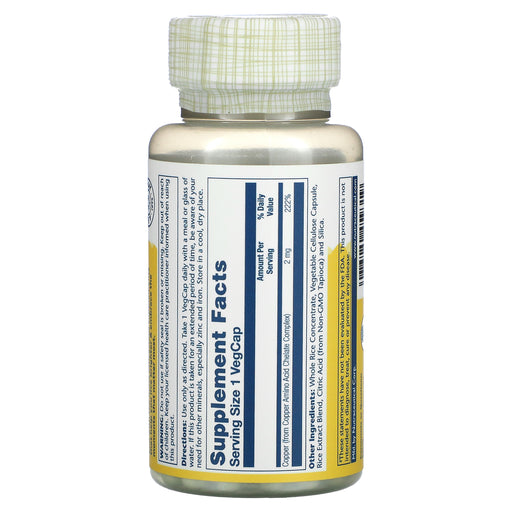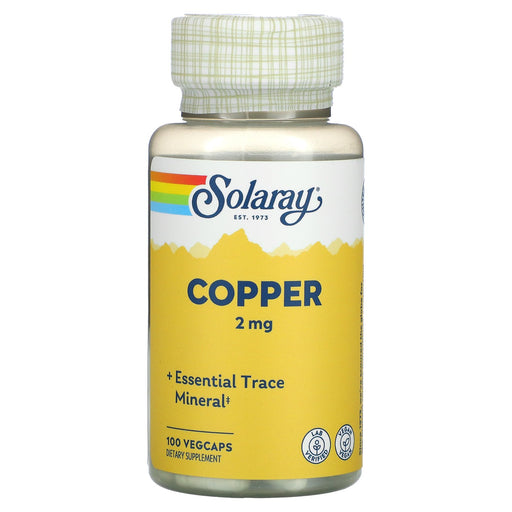
Supporting Optimal Health and Well-Being with Copper Supplements
Copper is an essential trace mineral that plays a vital role in various physiological processes throughout the body. From supporting energy production and iron metabolism to maintaining healthy skin, hair, and connective tissues, copper is a crucial nutrient for overall health and well-being. While copper deficiency is relatively rare, ensuring adequate intake through a balanced diet or targeted supplementation can help support optimal physiological function and prevent potential health concerns.
The Role of Copper in the Body
Copper is involved in numerous enzymatic reactions and biological processes, including:
- Energy Production: Copper is a key component of cytochrome c oxidase, an enzyme essential for cellular energy production in the mitochondria.
- Iron Metabolism: Copper is necessary for the proper absorption, transport, and utilization of iron in the body, playing a crucial role in the formation of red blood cells and the prevention of anemia.
- Antioxidant Defense: As a cofactor for the antioxidant enzyme superoxide dismutase (SOD), copper helps protect cells from damage caused by free radicals and oxidative stress.
- Connective Tissue Formation: Copper is essential for the synthesis and cross-linking of collagen and elastin, the primary structural components of skin, bones, and connective tissues.
- Neurotransmitter Synthesis: Copper is involved in the production of neurotransmitters like dopamine and norepinephrine, which are crucial for mood, cognitive function, and nervous system health.
While copper is found in various food sources, such as liver, seafood, nuts, seeds, and whole grains, some individuals may benefit from targeted supplementation to ensure optimal intake and support specific health goals.
Benefits of Copper Supplementation
Incorporating copper supplements into your health routine may offer several potential benefits, including:
- Supporting Energy Levels: By facilitating cellular energy production, copper supplements may help support overall energy levels and reduce feelings of fatigue.
- Promoting Healthy Iron Status: Copper supplements can help support proper iron absorption and utilization, contributing to the prevention of iron-deficiency anemia and its associated symptoms.
- Maintaining Skin, Hair, and Nail Health: As a crucial component of collagen and elastin synthesis, copper supplements may help support the health and integrity of skin, hair, and nails.
- Supporting Bone and Joint Health: Copper's role in collagen formation and cross-linking may help maintain bone density and joint health, reducing the risk of age-related degenerative conditions.
- Boosting Antioxidant Defense: By supporting the activity of the antioxidant enzyme SOD, copper supplements may help enhance the body's natural defense against oxidative stress and cellular damage.
Choosing the Best Copper Supplement
When selecting a copper supplement, it's essential to choose a high-quality product from a trusted brand. Consider the following factors:
- Form of Copper: Copper supplements are available in various forms, such as copper gluconate, copper citrate, and copper bisglycinate. Look for highly bioavailable forms to ensure optimal absorption and utilization.
- Quality and Purity: Opt for supplements manufactured in GMP-certified facilities, free from contaminants and impurities, and third-party tested for purity and potency.
- Appropriate Dosage: Choose supplements that provide a safe and effective daily dose of copper, typically ranging from 1-3 mg per day for adults, depending on individual needs and health status.
- Synergistic Nutrients: Some copper supplements may include other complementary nutrients, such as zinc, vitamin C, or B vitamins, to support overall health and well-being.
- Brand Reputation: Select supplements from reputable brands with a history of producing high-quality, science-backed products and a commitment to transparency and safety.
Tips for Incorporating Copper Supplements into Your Health Routine
To maximize the benefits of copper supplements and support your overall health and well-being, consider the following tips:
- Pair with a Balanced Diet: While supplements can help ensure adequate copper intake, they should be used in conjunction with a balanced diet rich in whole foods, including copper-rich sources like liver, seafood, nuts, seeds, and whole grains.
- Balance with Zinc: Copper and zinc have an antagonistic relationship in the body, meaning that high levels of one can interfere with the absorption and utilization of the other. Ensure a balanced intake of both minerals through diet and supplementation.
- Monitor Iron Status: If you are taking copper supplements to support iron metabolism and prevent anemia, work closely with your healthcare provider to monitor your iron levels and adjust your supplementation regimen as needed.
- Be Mindful of Interactions: Copper supplements may interact with certain medications, such as penicillamine or zinc supplements. Consult with your healthcare provider before starting any new supplement regimen to ensure safety and avoid potential interactions.
- Follow Recommended Dosages: Stick to the recommended daily dosage of copper supplements, as excessive intake can lead to potential toxicity and adverse health effects.
Support Your Overall Health and Well-Being with Copper Supplements from Health Orchard
Ensure optimal copper intake and support various aspects of your health with Health Orchard's selection of high-quality copper supplements. Our carefully curated collection offers a range of options to suit your individual needs and preferences, from highly bioavailable forms to synergistic formulations.
Experience the potential benefits of this essential trace mineral for yourself, from supporting energy levels and iron metabolism to maintaining healthy skin, hair, and connective tissues. With a commitment to quality, purity, and your overall well-being, Health Orchard is your trusted partner in harnessing the power of copper for optimal health and vitality.
Frequently Asked Questions about Copper
1. What is copper supplement good for?
Copper supplements are primarily used to treat or prevent copper deficiency, which can lead to anemia, osteoporosis, and impaired immune function. Copper plays a crucial role in various bodily functions, including:
- Formation of red blood cells
- Maintenance of nerve cells and immune system
- Absorption and utilization of iron
- Support of strong bones and connective tissues
- Promotion of healthy skin and hair pigmentation
- Regulation of gene expression and energy production
Copper supplements may also be beneficial for individuals with certain health conditions, such as osteoarthritis and cardiovascular disease, although more research is needed to confirm these potential benefits.
2. What is the best form of copper to take?
The best form of copper to take as a supplement is copper bisglycinate, also known as copper chelate. This form of copper is bound to two glycine molecules, which enhances its absorption and bioavailability in the body. Copper bisglycinate is less likely to cause gastrointestinal discomfort or nausea compared to other forms of copper supplements, such as copper sulfate or copper oxide. It is important to follow the recommended dosage and consult with a healthcare professional before starting any copper supplementation, as excessive copper intake can lead to toxicity and adverse health effects.
3. Is copper good for the kidneys?
Copper is essential for various bodily functions but its direct impact on kidney health is not well established. At normal levels, copper does not appear to have significant detrimental effects on the kidneys. However, excessively high levels of copper can potentially cause kidney damage. This is particularly a concern for individuals with genetic disorders like Wilson's disease that lead to abnormal copper accumulation in the body. Additionally, certain conditions that impair kidney function may also affect copper metabolism and excretion. Overall while copper is necessary it's crucial to maintain a balance and not exceed recommended intakes to prevent potential kidney-related issues.
4. What vitamins should not be taken with copper?
Certain vitamins and minerals can interfere with copper absorption or metabolism when taken in high doses or in combination with copper supplements:
- Zinc: Excessive zinc intake can reduce copper absorption and lead to copper deficiency
- Iron: High doses of iron can also interfere with copper absorption
- Vitamin C: While generally beneficial, high doses of vitamin C (>1,000 mg/day) may decrease copper absorption
- Molybdenum: Excessive molybdenum intake can interfere with copper utilization in the body
To minimize potential interactions, it is best to take copper supplements at least 2 hours apart from other supplements or medications and to consult with a healthcare professional to ensure proper dosing and combination of nutrients.
5. How does copper benefit the body?
Copper is an essential mineral that benefits the body in numerous ways:
- Blood cell formation: Copper is necessary for the production and function of red blood cells, which transport oxygen throughout the body
- Connective tissue health: It plays a role in the synthesis and maintenance of collagen and elastin, which are essential for strong bones, skin, and blood vessels
- Immune function: Copper supports the activity of various immune cells and helps protect against oxidative stress
- Nervous system function: It is involved in the production of neurotransmitters and the maintenance of nerve cells, supporting brain function and cognitive health
- Energy production: Copper is a component of enzymes involved in cellular energy production and metabolism
- Iron metabolism: It helps in the absorption and utilization of iron, preventing anemia
- Antioxidant defense: Copper is a cofactor for antioxidant enzymes that help protect cells from damage caused by free radicals
6. Can you take copper every day?
Yes, you can take copper supplements every day, provided you are following the recommended daily allowance (RDA) and under the guidance of a healthcare professional. The RDA for copper varies by age and sex:
- Adults (19+ years): 900 mcg/day
- Pregnant women: 1,000 mcg/day
- Lactating women: 1,300 mcg/day
It is important not to exceed the tolerable upper intake level (UL) of 10,000 mcg/day for adults, as excessive copper intake can lead to adverse health effects. Most people can obtain sufficient copper through a balanced diet that includes copper-rich foods like liver, seafood, nuts, seeds, whole grains, and dark leafy greens. Copper supplements are generally only necessary in cases of deficiency or certain health conditions, as determined by a healthcare provider.
7. What are the signs of a copper deficiency?
Copper deficiency is relatively rare but can occur due to inadequate dietary intake, malabsorption disorders, or excessive zinc supplementation. Signs and symptoms of copper deficiency may include:
- Anemia (low red blood cell count)
- Fatigue and weakness
- Pale skin
- Brittle or easily broken bones (osteoporosis)
- Frequent infections due to impaired immune function
- Poor wound healing
- Neurological symptoms, such as numbness, tingling, or difficulty with balance and coordination
- Abnormal hair and skin pigmentation
- Cardiovascular issues, such as an enlarged heart or irregular heartbeat
- Growth and development problems in children
If you suspect a copper deficiency, consult a healthcare professional for proper diagnosis and treatment. They may recommend dietary changes, copper supplements, or address any underlying health conditions contributing to the deficiency.










